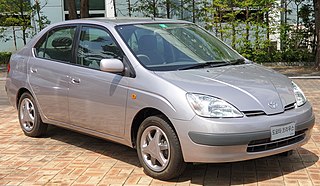
A hybrid vehicle is one that uses two or more distinct types of power, such as submarines that use diesel when surfaced and batteries when submerged. Other means to store energy include pressurized fluid in hydraulic hybrids.
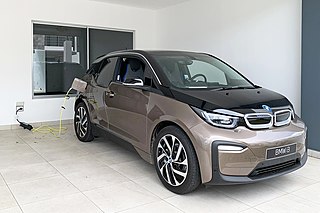
An electric vehicle (EV) is a vehicle whose propulsion is powered fully or mostly by electricity. EVs include road and rail vehicles, electric boats and underwater vessels, electric aircraft and electric spacecraft.

The Grumman Long Life Vehicle (LLV) is an American light transport truck model designed as a mail truck for the United States Postal Service, which has been its primary user since it first entered service in 1986, 38 years ago. It was also used by Canada Post. The LLV uses a chassis built by General Motors based on its Chevrolet S-10 with an aluminum body built by Grumman.

Isuzu Motors Ltd., commonly known as Isuzu, is a Japanese multinational automobile manufacturer headquartered in Yokohama, Kanagawa Prefecture. Its principal activity is the production, marketing and sale of Isuzu commercial vehicles and diesel engines.

The Chevrolet Express is a series of full-size vans produced by General Motors since 1996. The successor to the Chevrolet G-series van, the Express is produced in passenger and cargo variants. Alongside the standard van body, the line is offered as a cutaway van chassis; the latter vehicle is a chassis cab variant developed for commercial-grade applications, including ambulances, buses, motorhomes, and small trucks.

International Motors is an American holding company created in 1986. The successor to the International Harvester manufacturing company, International produces trucks and diesel engines under its own brand; the company produces buses under the IC Bus name. Since July 2021, the company has operated as an independent subsidiary of Traton, which is the heavy-vehicle operations arm of the Volkswagen Group.
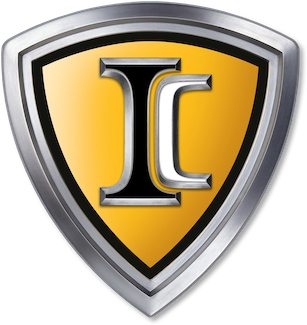
IC Bus is an American bus manufacturer. Headquartered in Lisle, Illinois, IC is a wholly owned subsidiary of Navistar International. Established in 2002 by Navistar through the reorganization of subsidiary manufacturer American Transportation Corporation (AmTran), IC currently produces school buses and commercial-use buses for multiple applications.

FedEx Express is a major American cargo airline based in Memphis, Tennessee, United States. As of 2023, it is the world's largest cargo airline in terms of fleet size and freight tons flown. It is the namesake and leading subsidiary of FedEx Corporation, delivering freight and packages to more than 375 destinations over 220 countries across six continents each day. FedEx Express is also the world's largest express transportation company.

Van Hool NV is a Belgian coachbuilder and manufacturer of buses, coaches, trolleybuses, and trailers.

An electric truck is a battery electric vehicle (BEV) designed to transport cargo, carry specialized payloads, or perform other utilitarian work.
Utilimaster, a subsidiary of The Shyft Group, manufactures multi-stop trucks. It was founded in 1973 in Wakarusa, Indiana.

The Nissan Caravan is a light commercial van designed for use as a fleet vehicle or cargo van and manufactured by Nissan since 1973. Between 1976 and 1997, a rebadged version of the Caravan sold as the Nissan Homy, which was introduced as an independent model in 1965. Outside Japan, the Caravan was also sold as either the Nissan Urvan or Nissan King Van, or earlier with Datsun badging.

The Isuzu Elf is a medium duty truck produced by Isuzu since 1959. Outside Japan it is known as N series and Q Series. The range was originally mainly available in Japan and other Asian countries. Australia was another important market for the Elf and N series – to the extent that it was manufactured there from the 1970s using many local components. Since the early 1980s, it has also been sold and built in the United States, and also as the Isuzu N-Series. Only North America receives the wide-cab version.
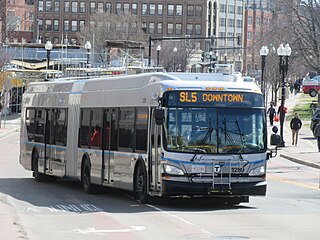
A hybrid electric vehicle (HEV) is a type of hybrid vehicle that combines a conventional internal combustion engine (ICE) system with an electric propulsion system. The presence of the electric powertrain is intended to achieve either better fuel economy than a conventional vehicle or better performance. There is a variety of HEV types and the degree to which each functions as an electric vehicle (EV) also varies. The most common form of HEV is the hybrid electric car, although hybrid electric trucks, buses, boats, and aircraft also exist.

An alternative fuel vehicle is a motor vehicle that runs on alternative fuel rather than traditional petroleum fuels. The term also refers to any technology powering an engine that does not solely involve petroleum. Because of a combination of factors, such as environmental and health concerns including climate change and air pollution, high oil-prices and the potential for peak oil, development of cleaner alternative fuels and advanced power systems for vehicles has become a high priority for many governments and vehicle manufacturers around the world.
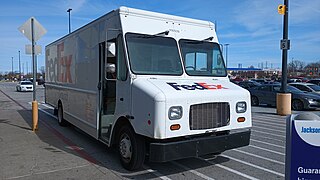
A multi-stop truck is a type of commercial vehicle designed to make multiple deliveries or stops, with easy access to the transported cargo held in the rear. They first appeared in the United States in the 1920s. They are usually vans or trucks designed to be used as fleet vehicles by businesses within local areas.

A hybrid electric truck is a form of truck that uses hybrid electric vehicle (HEV) technology for propulsion, instead of using only a combustion engine.

Mitsubishi Fuso Truck of America, Inc. (MFTA) is a wholly owned subsidiary of Mitsubishi Fuso Truck and Bus Corporation (MFTBC), Kawasaki, Japan, itself a part of Daimler Truck based in Logan Township, New Jersey, United States. MFTA imported and marketed Class 3 through Class 5 medium-duty cabover trucks through more than 200 dealer locations in the United States and Canada, until 2021. As of 2019, MFTA imported and marketed diesel-powered, gas-powered, and electric trucks. According to the company, more than 100,000 Mitsubishi Fuso standard, 4-wheel-drive and crew cab trucks had been sold in the Canadian and U.S. markets since the company's founding. Applications included beverage, catering, refrigerated and dry cargo delivery, vehicle recovery, towing, pest control, plumbing, light construction and landscaping, overlanding, among others.

The Volvo 7900 is an integrally-constructed single-decker rigid bus and single-decker articulated bus, most commonly available as a hybrid electric bus named Volvo 7900 Hybrid or just Volvo 7900H, but is also available with both diesel and Compressed Natural Gas (CNG) engines in some markets. It was manufactured at Volvo's plant in Poland until 2023. From now on the bodywork is manufactured on licence by MCV Bus and Coach in Egypt.The MCV assembled 7900 features a slightly updated front, similar to the Volvo 8900 Electric. The Volvo 7900 was introduced at Busworld Kortrijk 2011. Based on the Volvo 7900 Hybrid an extension is offered, which i.a. includes a roof-mounted device for occasional loading at stops. The manufacturer assumes that all buses at all end stations and also at some particularly busy stations stay a few minutes until the return or onward journey. As soon as a bus reaches an appropriately equipped stop, a loading unit attached to a pillar at the roadside lowers onto the coupling point mounted on the roof of the bus. The charging process ends as soon as the bus wants to continue or the battery is full. According to the manufacturer, this equipment allows compared to conventional hybrid buses significantly extending the travel time in electric mode and a reduction in fuel consumption. The vehicle and the charging system were first presented to the public in September 2014 at the International Motor Show.

The Workhorse C-Series was an American line of battery electric medium-duty delivery vans built by Workhorse Group for commercial package delivery company fleets, which entered limited production in 2021, were recalled that September, and were discontinued in 2022 after fewer than fifty were built. The C-Series was originally named the N-GEN when the line was first announced in 2017. N-GEN prototypes began testing in 2018 and were renamed to the C-Series in 2019.




















